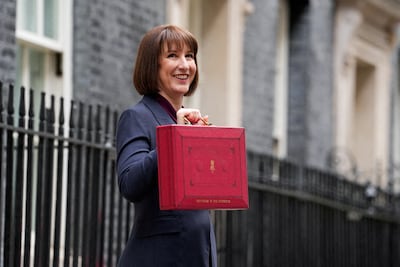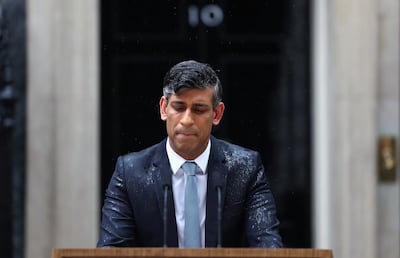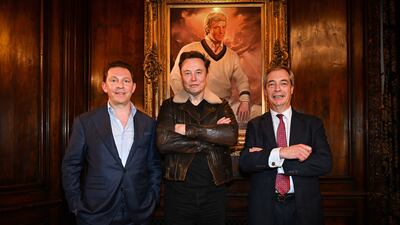The most politically significant UK picture of 2024 came at the end, with Nigel Farage, Nick Candy and Elon Musk standing in front of a portrait of Donald Trump at Mar-a-Lago.
There are other candidates: Rishi Sunak announcing an early election in the pouring rain; a victorious Keir Starmer entering Downing Street; Rachel Reeves delivering the first Labour Budget in 14 years; and others. But it’s the three of them together that is the game-changer.
If, as seems likely, Mr Musk donates $100 million to Farage’s Reform UK, that will transform the landscape. The fledgling party will have funds, the like of which have never been seen in Britain before. It could set them fair to leap up the rankings and who knows, put them on a winning path to the next election.
Not surprisingly, the very prospect has sent the main parties into a lather. There’s talk of somehow prohibiting that scale of gift or barring it on the ground that Mr Musk is a foreigner. The probability of either occurring must be low – the UK has never capped donations and it smacks of government interference and Mr Musk can circumvent the overseas rule by making the payment via the UK arm of his privately-held business empire.
An ebullient Mr Farage and Mr Candy are promising not to stop there. Mr Candy, the wealthy property developer and newly installed finance chief for Reform UK, is saying he will secure more of the same – not of that magnitude but large amounts of cash from other business figures. Already, he’s claiming previous Tory backers are indicating their intention to move across.
There’s no doubt Mr Farage and Mr Candy will attract support from like-minded entrepreneurs, those who tend to be lone operators and can take such decisions themselves. But will it go deeper and broader, so that mainstream business swings in behind Reform UK?

The instinctive answer is that it is unlikely. Mr Farage was the evangelist for Brexit, and the City and industry were almost universally opposed to leaving the EU. The fact little positive has happened since to justify the move has reinforced that view. The UK economy is worse off and firms have been burdened with yet more red tape as they attempt to export and import from the EU, as well as labour shortages. It was telling that at the recent farmers’ protests against Reeves’s Budget, Farage was present but said little for fear of riling those struggling with the difficulty of bringing in seasonal workers from abroad to harvest their crops.
The idea of not only forgiving Mr Farage but actively promoting him, remains anathema to the business community. In companies that have bent over backwards to increase diversity and inclusivity in recent years, his hard line on immigration is widely regarded as extreme and divisive. Businesses, too, know the value immigrants can add, they want their skills and expertise – something increasingly important in the face of ever-fiercer global competition.
Mr Farage is a maverick, a flamboyant chancer, and business traditionally dislikes such people, preferring to side with the tested and trusted.
There is, though, a major qualification coming and it’s this: business is completely fed up with the current main parties. For a decade and more, the Tories, who love to claim they are there for business, failed to deliver.

Britain’s place in the world
Now, there is Labour but the record to date is, to say the least, disappointing. After wooing boardrooms and investors with talk of understanding their concerns and being right behind them, once in power Mr Starmer and Ms Reeves have served only to antagonise. The tax rises in the budget were aimed at employers not employees (although there is bound to be a knock-on effect in fewer hirings). There was a distinct absence of talk of economic growth, no sign of positivity and vision. At the same time they’re to be clobbered by Labour’s new worker protection laws.
There is as well, a profound unease concerning Britain’s place in the world. The ‘special relationship’ with the US has failed to provide any dividends, post-Brexit and is subject to uncertainty as we head towards Mr Trump’s second term. The incoming president is threatening rises in tariffs and US protectionism – the last thing British exporters desire. It’s unclear how much Britain will be affected but a trade war involving the US, China and EU looms.
Mr Starmer’s installation of Lord Mandelson as Britain's new US ambassador, a Europhile with a record of disparaging remarks about Mr Trump, is unlikely to smooth the waters. Mr Farage cheekily and typically has suggested acting as intermediary.
Confusion reigns, too, over China. Mr Starmer appears to want to cosy up to Beijing while his ministers and officials repeatedly portray China as a hostile actor, busy trying to spy on Britain. And where the EU is concerned. Mr Starmer, who went along with Brexit, is today talking of seeking closer relations with Brussels. While that is welcome by business, there is bound to be a price and the timing, given the current woes of Germany and France, smacks of too little, too late.

Mr Starmer has spoken of no further tax increases and Ms Reeves has said her Budget was a one-off. The polls say loud and clear they’re not believed. Businesses that develop long-term plans and stick to them are not impressed either by Mr Starmer’s ‘reset’. He has been in office a matter of months, with a huge majority behind him, yet he is floundering.
Suddenly, Mr Farage, who speaks with clarity and is prepared to challenge orthodoxy, is heralded by some as presenting a refreshing alternative. Whether his simplistic, optimistic, common-sense brand can translate into practical reality is, of course, a different matter. But Britain would not be alone in lurching to the right. Mr Farage, a former City commodity broker, hails as well from a commercial background. His commitment, and that of Mr Musk, to a reduced state machine also chimes.
Mr Farage and Mr Candy might just find they receive a warmer hearing than once appeared likely. As a senior businessman was overheard at a recent reception, ‘Why can’t Britain have a leader who believes in Make Britain Great Again?' It is a question that may gain currency in the year ahead.


